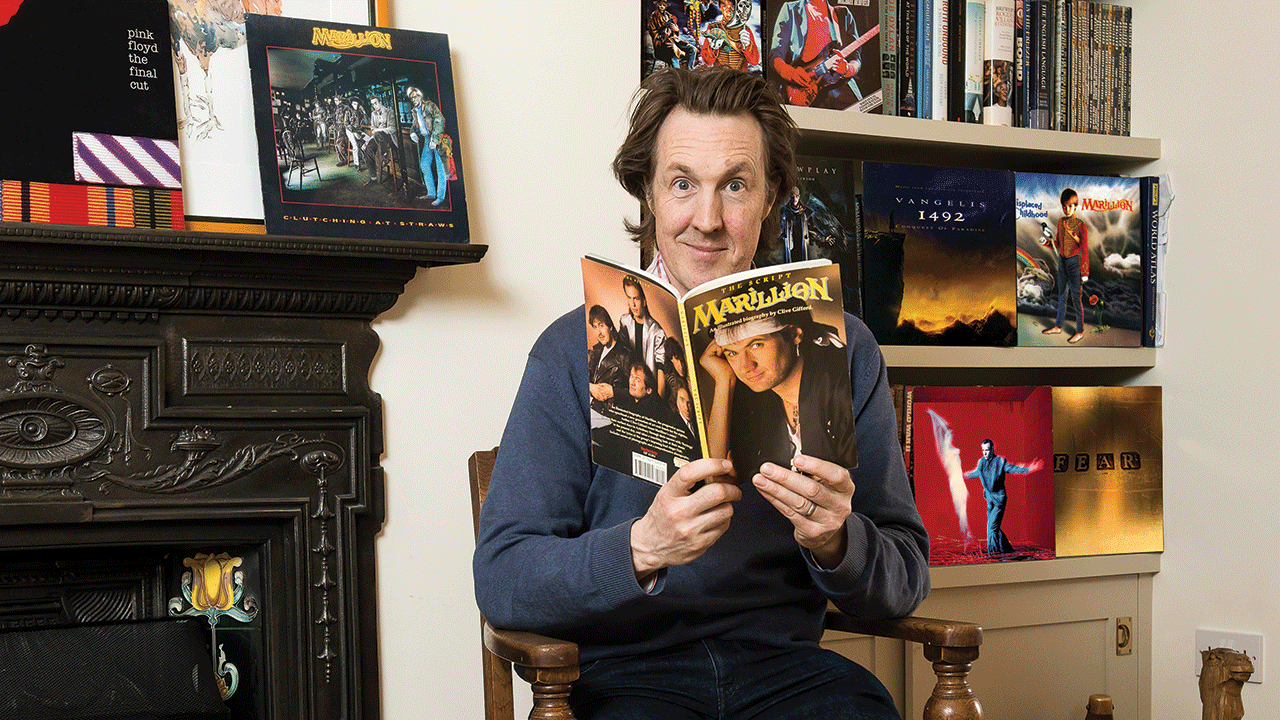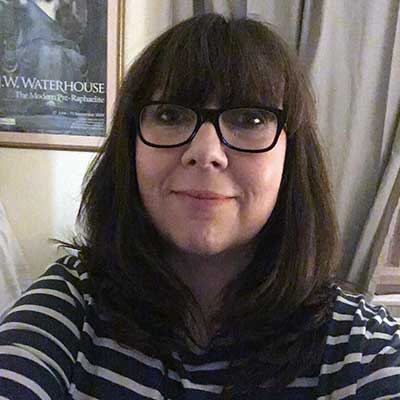For me, prog starts with Marillion. Growing up in St Clement, Jersey, Clutching At Straws was my first Marillion record. I saw Lavender on Top Of The Pops and Fish had just lost his voice so instead of miming, he got the audience to sing. I was hugely into comedy at the time and I couldn’t believe there was a band with someone in them who looked so much like Mel Smith.
Sugar Mice was the song that I really connected with and it became one of my all-time favourites. Clutching At Straws came out of nowhere – so unlike other pop music. No one was playing keyboards like Mark Kelly back then, it was all fake horn stabs. The keyboards had riffs, melodies. I was learning piano so there might have been a bit of, ‘Oh, I can be in a band.’ Also, I was a wordy, bookish child studying English and no one else was writing lyrics like Fish.
What cemented my endless love was when they came and played my local leisure centre. I still have my ticket and the setlist. I got there at three in the afternoon and ended up in the front row. Afterwards, me and my friends Simon and Danny wandered around in a daze. We walked back to my house and on the way went past the Hotel de la Plage, where important people usually stayed. We hung out until we saw Marillion’s van pull up. Then we saw Fish and he said hello and told us he was going to go inside and get pissed.
- Meet the best turntables for your record collection
- Smaller budget? No problem! These are the best budget turntables
I then started playing in my friend Patrick’s band, Songvolution. Their keyboard player had pulled out before an audition for a local festival and I thought I was filling in, but actually I was joining. It was great fun, I loved it. There was me, Patrick, James and Danny, and I got my musical education here. Patrick was really into The Beatles, Floyd and Yes. Danny was into Genesis and James into Tull. We were wildly ambitious musically, playing Aqualung and rehearsing Turn It On Again. Then Patrick used to do Thick As A Brick acoustically and Mother Goose. Patrick told me, ‘You’ve got to get [Yes’] Close To The Edge.’ I got a copy from Music & Video Exchange and it left my jaw on the floor. Eighteen minutes of Close To The Edge – that was enough music for 10 albums and I never felt they were just showing off. Even though Jon Anderson’s lyrics are nonsense, the final four lines of And You And I will bring me to tears. I feel he’s singing about nostalgia and friendship and love and the divine. I went back to Patrick and asked, ‘What else is there?!’ He recommended Pink Floyd. We covered Comfortably Numb and Another Brick In the Wall. This is the straight-up kind of guy I am: when we were playing the school fête in our last year, I argued very strongly that we shouldn’t do Another Brick… as it was disrespectful to the school. Oh God! That was me.
I love Dark Side Of The Moon but the album I go to every time is Wish You Were Here, for Shine On You Crazy Diamond. That’s four minutes of keyboards, five minutes of guitar. I love how they can take their time with it and there’s no indulgence in this beautiful eulogy to their friend. Patrick was a slightly madcap, Barrett-esque figure so it reminds me of him. Wish You Were Here is a hymn, one of the greatest songs ever written. I’ll give a shout‑out to The Final Cut, though. It’s often overlooked but that was a big one for me too.
Dire Straits were my first big band love and I’m still a massive fan. My argument for them being prog is the Love Over Gold album and the opener, Telegraph Road. It’s 14 minutes long, it’s got about seven parts, it’s got instrumental virtuosity, it tells a story, it’s bold and ambitious. Then Private Investigations is an incredible piece of mood music and in several parts. Love Over Gold even ends with a one-minute marimba solo, so it’s prog jazz!
Mark Knopfler is just hugely important to me: he got me into Dylan, Lonnie Johnson, Chet Atkins, JJ Cale, Randy Newman… tracing his influences opened up my musical world. This was the uncoolest band for a teenager to like, it was ‘yuppie music’, but I genuinely loved them. And even if I didn’t love them, just saying I did was possibly the most rebellious thing I could have done. Knopfler is a brilliant songwriter, and in my most pretentious phase I would compare his songwriting to the dramatic monologues of Robert Browning – he gives such a deft and quick portrayal of character. I wrote a novel [Mainlander] and it’s full of music. I wanted to quote from Dire Straits’ The Man’s Too Strong but I couldn’t get a response from the manager. But I did get Marillion in it, a lyric from Jigsaw!
I work to music a lot and I wanted it to be part of people’s lives in my writing because in real life it is, and it’s shorthand for a character – say someone pulls up in a car blaring out ZZ Top, you already understand who this person is.
Sledgehammer got me into Peter Gabriel. So was an incredible album, a greatest hits in itself. Don’t Give Up was a big track for me. I had a hard time at the end of school and that was something I listened to a lot, a great source of solace. Then there’s Us, which I love, and it reminds me of my time at Southampton Uni. He’s an incredible communicator, and this album is all about heartbreak.
Blade Runner and Voices are terrific but 1492: Conquest Of Paradise is the Vangelis album I listen to the most. It’s a mix of piano, synth and choral work and its soundscapes are really good to work to. The last track, Pinta, Niña, Santa María (Into Eternity), is about 15 minutes long but doesn’t outstay its welcome. Prog is undoubtedly the keyboard genre and it’s no surprise he was asked to join Yes.
I fell away from Marillion after Holidays In Eden but I came back to them when I was doing my Misplaced Childhood stand-up show in 2005 – the hook was also how childhoods have changed since the album came out. It was a mini-sitcom and I filmed with Fish at his home for part of it and used Mark Wilkinson’s art.
Afraid Of Sunlight and Marbles were my way back in for the group, but I kept with Fish ever since he left the band. Feast Of Consequences is such a strong album; like Gabriel, you feel he’s giving something of himself to the audience each time. Fish is a great writer in any form – that ability to conjure a character, his use of language, he could easily be writing novels. And the same with Marillion and F.E.A.R. This is definitely one of their best Hogarth-era albums. It’s so timely and I love the Floydian stretching out on Gold.
I’ve already got my tickets for Fish performing Clutching At Straws this year. Fish and Marillion gave me so much growing up, I want to give back to them. I love them and I want the world to see how brilliant they are.”
Mainlander is out now. Follow Will on Twitter @willsmithwriter
Designer, historian and writer Phil Smee shows us his record collection
We take a look through Penny Smith's record collection
We have a leaf through Pub Landlord Al Murray's record collection

